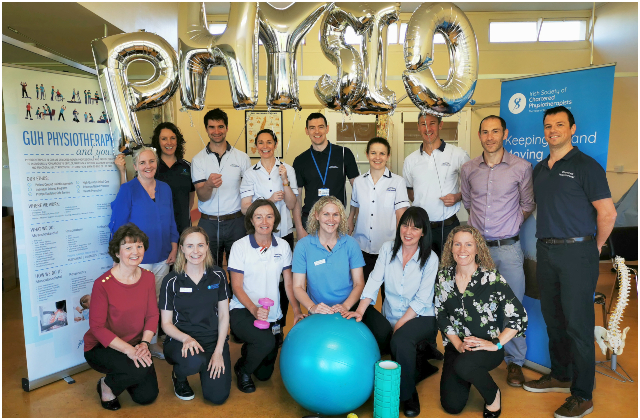![]()
You are here
Chronic Pain Advice from Physiotherapists in Merlin Park University Hospital

To mark International Chronic Pain Awareness Month, the Physiotherapy Department in Merlin Park University Hospital are holding a Chronic Pain Awareness Day on Thursday 26 September from 10am to 11am and from 12pm to 1.30pm in the hospital canteen in Block B. On the day, staff, patients and visitors will have the opportunity to meet with experienced physiotherapists who work with people experiencing chronic pain.
There are two main types of pain: acute pain and chronic pain. Acute pain is really important and keeps us safe by pointing out potential tissue damage and usually comes on suddenly as a result of a specific incident such as a significant trauma or fracture. Chronic pain is persistent pain that continues for longer than 3 months and continues beyond normal tissue healing times for an injury or trauma. Unlike acute pain, chronic pain serves no biological purpose as it does not accurately reflect tissue damage.
Anita Kerins, Physiotherapist explains, “Pain is very complex and is an expression of the nervous system and the many factors that influence it. Studies now show that as well as physical factors, pain can be influenced by stress levels, negative thoughts, sleep disturbances, poor diet, depression and much more. Pain occurs when the brain perceives damage or the threat of damage to the body and wants action.
“The pain system, like any other system in the body, can malfunction - it may become overly sensitised and produce pain in response to a perceived threat to the body, similar to a faulty fire alarm going off when there is no actual fire. When our body perceives a threat, it causes us to move differently with more muscle tension, bracing and even breath holding which may make the pain worse. People can get caught in a cycle of reduced movement, increased fear, reduced strength and flexibility and this leads to more pain.
“The role of physiotherapy in the treatment of chronic pain has changed and evolved. As well as evaluating the physical function of the person, we now take a holistic approach which provides a better picture of the impact of the pain and helps us to manage the problem for a better outcome. We work with patients to give them an experience of moving with more ease and reduced tension and this then gives them confidence to gradually build up tolerance to exercise again. It’s amazing how this can happen so quickly and transform their lives. It may not take all their pain away but it gives them confidence to do things they thought they could never do.
“Chronic pain is a significant global health burden. Studies have estimated that approximately 1 in 3 adults and 1 in 10 school-going children in Ireland suffer with chronic pain. We know that exercise and remaining active is one of the most effective ways to takeback control of your pain and life. It is important to work with a chartered physiotherapist who will help you regain confidence.
“If you have any concerns about chronic pain for yourself or a family member, we advise that you speak with your GP or visit a chartered physiotherapist listed on the Irish Society of Chartered Physiotherapists website www.ISCP.ie.”
The article above is specific to the following Saolta hospitals::
Merlin Park University Hospital (MPUH)
Keywords:
